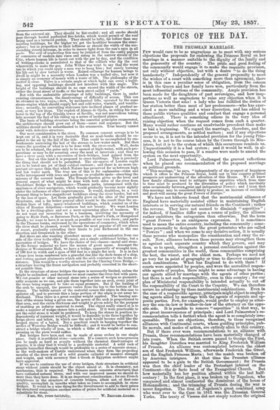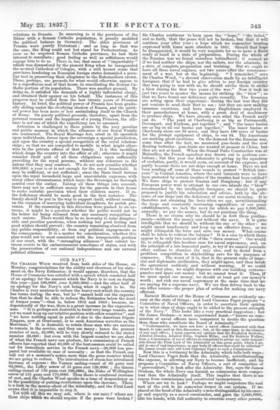TOPICS OF THE DAY.
THE PRUSSIAN MARRIAGE.
FEw would care to be so ungracious as to meet with any serious objections the proposals for endowing the Princess Royal on her marriage in a manner suitable to the dignity of the family and the generosity of the country. The pride and good feeling of the community would engage it to make the requisite provision, not only without objection but with a desire to do the thing handsomely." Independently of the general propensity to meet the wishes of a court with something more than agreement, there is in this case a peculiar sense of obligation, from the esteem which the Queen and her family have won, particularly from the most influential portions of the community, Ample provision has been made for the daughters of past sovereigns, and how inopportune as well as ungracious to raise any objection when it is Queen Viotoria that asks ! a lady who has fulfilled the duties of her station better than most of -her predecessors—who has exercised a more unfailing and a wiser discretion' and has added to those public virtues qualities and conduct that engage a personal attachment. There is something odious in the very idea of raising objection when the request comes from such a quarter. Many, would rather continue an =advisable precedent than make so bad a beginning. We regard the marriage, therefore, and the proposed arrangements, as settled matters ; and if any objections occur to us, it is not to the intended provision for the young Princess, it is not to the course taken by the Crown through its Ministers, but it is to the system of which this occurrence reminds us. Unquestionably it is a bad system ; and it would be well, in allowing this occasion to pass, if a resolve were made to amend the system on the next opportunity.
Lord Palmerston, indeed, challenged the gravest reflections when he placed one recommendation of the proposed marriage on political grounds.
"This marriage," he says, "independently of the prospect of happiness which it offers to the Pnncess Royal, holds out to this country political prospects not undeserving of the attention of this House. We all know how family alliances tend to mitigate those asperities which from time to time must be produced by the diversities of policy which inevitably arise occasionally between.great and independent Powers; and I trust that this marriage may be oonsidered likely to produce an increase of cordiality and good-will among the great Powers of Europe."
We have not hitherto found that the matrimonial alliances of England have materially assisted either in maintaining English interests or in serving our natural friends on the Continent ; rather the reverse. They have not seemed to diminish " asperities " ; for indeed, if families differ upon a course of policy, the alliance rather embitters the antagonism than otherwise. But the term "great Powers" is an ambiguous expression. It is sometimes used to mean the entire country, including the community ; sometimes personally to designate the great potentates who are called "Powers " ; and when we come to any decisive action, it is usually those persons who monopolize the consideration and sway the result. Now, alliances between these persons may strengthen them as against each separate country which they govern, and may thus, so to speak, strengthen a personal combination against the greatest communities in the world, those communities comprising the best, the wisest, and the ablest men. Perhaps we need not go very far in point of geography or time to discover examples of such combinations. What has England to do with them ? If courts were appointed by peoples, and were the accredited responsible agents of peoples, there might be some advantage in having our agents allied by marriage with the agents of other parties ; but there is not such responsibility, even in this country ; for our plan of Ministerial responsibility is intended actually to cut off the responsibility of the Court to the Country. We can therefore secure no advantage by these matrimonial combinations. Even in the case of a responsible agency, principals might object to employing agents allied by marriage with the agents of separate and opposite parties. Few, for example, would prefer to employ as attorney the son-in-law or brother-in-law of the attorney on the opposite side. It is possible to remove " asperities " in that way, to the great inconvenience of principals ; and Lord Palmerston's recommendation tells a fortiori when the agent is so completely irresponsible. There are objections, therefore, to these recognized alliances with Continental courts, whose guiding principles, public morals, and modes of action, are entirely alien to this country. But if there ever were recommendations to an alliance with Prussia, those recommendations have been materially changed of late years. When the British crown passed to George the First, his daughter Dorothea was married to King Frederick William of Prussia. An alliance was contemplated between the eldest son of that Frederick William, afterwards Frederick the Great, and the English Princess Maria ; but the match was broken off by Austrian intrigues. At that time the Prussian alliance appeared to be a gain to the British Government; for Prussia was then the chief leader of the Protestant interest on the Continent—the de facto head of the Evangelical Church. But how materially has her position altered within the last halfcentury ! In the first place, it was broken up by Napoleon, who conquered and almost confiscated the dominions of the house of Hohenzollern ; and the trimming of Prussia during 'the war is never forgotten. The first of l‘apoleon's great combined army who went over to the Czar in 1812 was the Prussian General. Yorke. The treaty of Vienna did not simply restore the original relations to Prussia. In annexing to it the provinces of the Rhine with a Roman Catholic population, it greatly modified the political balance in Germany. The older provinces of Prussia were purely Protestant ; and as long as that was the case, the King could not but stand for Protestantism. As soon as he acquired Roman Catholic provinces, he had their interest to conciliate ; good feeling as well as selfishness would engage him to do so. There is, too, that sense of " impartiality " which was dramatized by the present King when he inaugurated the neutral Cathedral of Cologne, with a still keener sense that provinces bordering on Romanist foreign states demanded a peculiar tact in preserving their allegiance to the Hohenzollern crown. These, perhaps, are grounds for what would otherwise appear to be a superfluous zeal of that house in conciliating the Roman Catholic portion of its population. There was another ground. By doing so, it satisfied the demands of a highly influential clergy, and obtained their agency on his behalf. The instances of this progress may be culled from the last twenty years of Prussian history. In brief, the political power of Prussia has been gradually sliding under the overlying shadow of Russia, and the spiritual power has been more or less assimilating itself to the Church of Rome. On purely political grounds, therefore, apart from the personal reasons and the happiness of a young Princess, the alliance is not one of which the expediency can be assumed. Attention is challenged to these points by the very peculiar and publics manner in which the alliances of our Royal Family are contracted. The Royal Marriage Act, cruel in its operation upon individuals, forces upon the sovereign a special jurisdiction, and upon the country a special recognition of the royal relationships ; so that we are compelled to meddle in what might otherwise be the private affairs of that family. It is this meddling which drags the country into the affair at all; otherwise it might consider itself quit of all these obligations upon sufficiently providing for the royal persons, without any reference to the unions that they may contract. We do not now consider whether 400,000/. a year is or is not enough for the royal household. It may be sufficient, or not sufficient ; since the State itself fastens upon the royal household large and unavoidable expenses, with many other circumstances which leave the Sovereign no thorough control over the outlay. Taking all these things into account, there may not be sufficient money for the parents in that house to make suitable provision when their children marry. If so, the deficiency should be made good in the first instance. The family should be put in the way to support itself, without coming, on the occasion of marrying individual daughters, for parish provision. If the reasoning in this direction were pushed to an extreme, it might be a question whether the public would not be the better for being released from any necessary recognition of such unions. There would then be no necessity to raise disagreeable and peculiar questions, when nothing but good feeling and good wishes should prevail ; the country remaining absolved from any public responsibility, or from any political engagements as the consequence. It is a matter for consideration, whether this plan would not be most consistent with the irresponsible position of our court, with the "entangling alliances" that subsist between courts to the embarrassment sometimes of states, and with the preservation of our national independence and our natural political alliances.



























 Previous page
Previous page